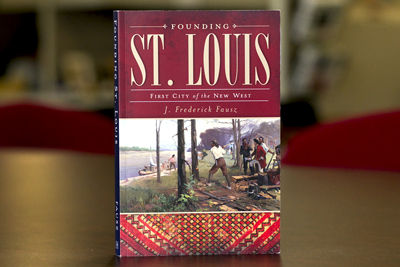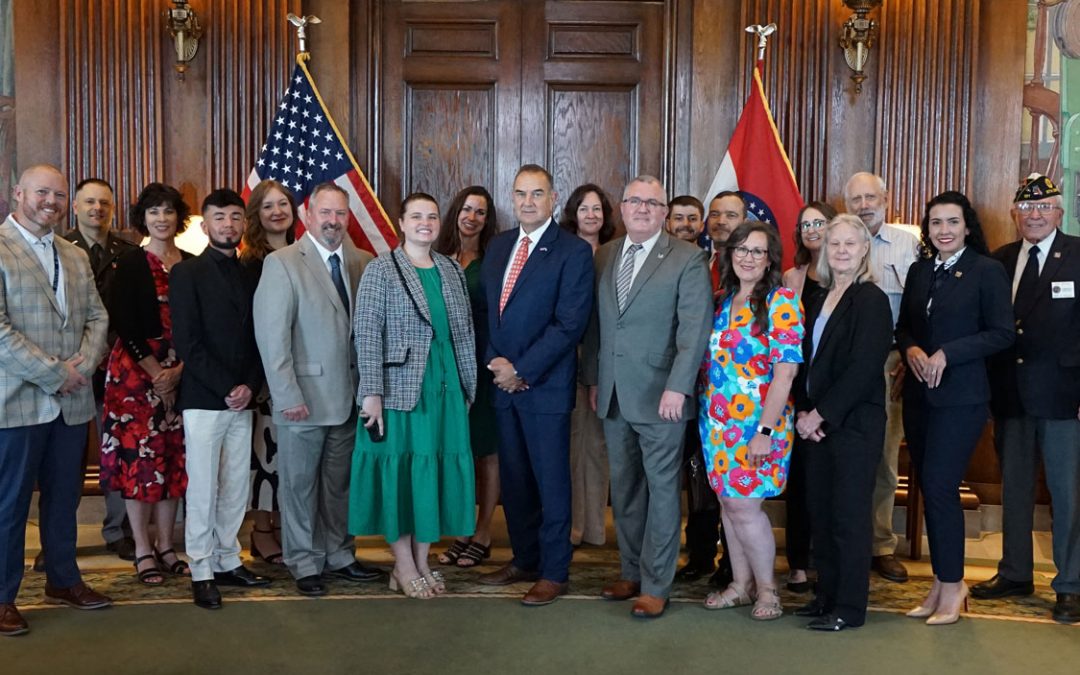
"Founding St. Louis: First City of the New West" was written by J. Frederick Fausz, associate professor of history at UMSL.
J. Frederic Fausz, associate professor of history at the University of Missouri–St. Louis, set out to explore the 250-year-old mystery of why and how French St. Louis was founded. The result is his new book, “Founding St. Louis: First City of the New West.”
The book offers new insight into the roles people such as Pierre Laclede, the early Chouteaus, Saint Ange de Bellerive and the Osage Indians had in the founding of the Gateway City.
With “Founding St. Louis” released by The History Press and out now, UMSL News caught up with Fausz to discuss what his book offers that similar St. Louis history books don’t, how he got to know Pierre Laclede and why the French West seems to be ignored in American history.
Your book is billed as a “fresh interpretation of St. Louis from 1764 to 1804.” What does “Founding St. Louis” offer readers that other books might not?
My book is the first to reveal in great detail how and why St. Louis revived and relocated, preserved and expanded, French colonial culture after France’s American empire officially ended in 1763. Expertly planned by the last French governors in New Orleans; peopled by Canadians, Illinois Creoles, and immigrants from France; and prospering in the Missouri River fur trade dominated by the Osage Indians, the town quickly became a cosmopolitan French center of global commerce that prevented the British from occupying the trans-Mississippi West. I am the only American historian who has described Pierre Laclede’s early life in the fascinating province of Bearn, unraveled the mysteries of his name, and linked his later roles as city founder, fur trader, and frontier diplomat to the merchant oligarchy in New Orleans during the French and Indian War.
Did your career as a history faculty member at UMSL prepare you to write this book?
When arriving on this campus in 1991 as the first dean of the Pierre Laclede Honors College, I knew nothing about the founder of St. Louis and very little about the French heritage of the region. I grew up in “German Kentucky” and then spent 20 years in Chesapeake Bay country, earning a Ph.D. from The William and Mary College in Williamsburg, Va., and teaching thirteen years in “old colonial” Maryland. From the beginning of my professional career, I integrated Indians into my teaching of Colonial America and developed a specialty on fur trading. St. Louis proved to be a “paradise” for collecting fur trade artifacts, and in presenting public lectures throughout the region, I expanded my knowledge of the Osage Indians and became friends with several of them. Due to my extensive publications on Virginia, I was prepared to contrast the French and Jeffersonian policies on Indians and western expansion. I built on that research in annotating Auguste Chouteau’s “Narrative” and dating it accurately for the first time. Pursuing answers to the questions raised by that document compelled an in-depth investigation of Laclede’s life in France, New Orleans, Illinois, and early St. Louis. I learned that his greatest achievement was cultivating a significant “spirit of St. Louis” with Osage co-founders, who protected the tiny town and made it an “Indian capital” with European elegance enriched by international fur exports decades before the Louisiana Purchase.
Why do you feel the French West has been ignored in American History?
To the victors, go the spoils—including the writing of a self-serving national narrative that distorts history due to cultural and racial prejudices. After a century of intermittent warfare in North America, France lost its huge empire in 1762-1763 on both sides of the Mississippi River. However, some 100,000 French-Americans remained and offered an alternative to aggressive Anglo-American territorial expansion after the Revolutionary War. The Louisiana Purchase produced a cultural confrontation at St. Louis over differences in language, religion, legal traditions, and Indian relations. The Gateway Arch honors the Anglo-Americans under Jefferson and later U.S. presidents who transformed through conquest the peaceful, prosperous, and progressive French West that had existed for forty years. Until recently, it was considered “unpatriotic” to applaud the valuable heritage of “foreign French enemies” who found wealth in a so-called “wilderness” in partnership with invaluable “savages,” whom the U.S. also regarded as hostile foes.
Is this a good time to publish a book on French St. Louis?
Most definitely. Not only is there a resurgence of French colonial studies, but in 2014, we will celebrate the 250th anniversary of our city. I wanted to write a book that confronted and corrected the many myths and mistakes that have obscured an accurate assessment of St. Louis’s creation and legacy for too long. Many citizens know little about what began here in 1764, because the building of the Gateway Arch buried even the outlines of the original French town under tons of earth in total disregard for that earlier heritage. Similarly, the proposed remodeling of the Arch grounds has made the 50th anniversary of that monument to Jefferson national expansion seem more significant than the 250th anniversary of the city itself. Trivializing history continues in the silly names proposed for the new Mississippi River bridge that will open in 2014. Naming it the “Founders’ Bridge” or the “Laclede-Chouteau Bridge” in that memorable anniversary year would finally honor the French contributions in founding both Illinois and Missouri.
More information:
umsl.edu/~umslhistory/faculty/fausz.html
blogs.umsl.edu/news/2011/05/20/frenchstl/














